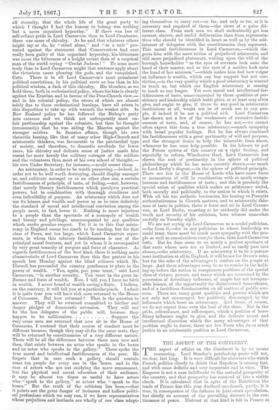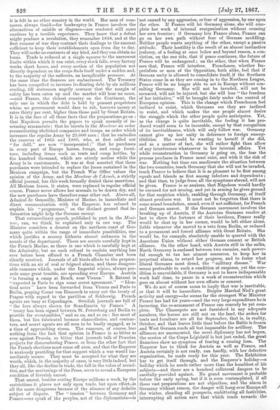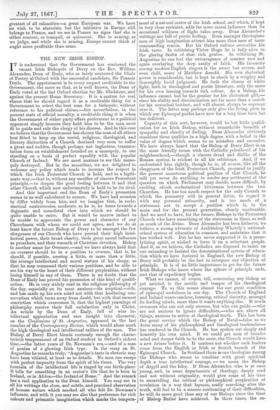THE ASPECT OF THE CONTINENT.
THE aspect of affairs on the Continent is by no means reassuring. Lord Stanley's patched-up peace will not, we fear, last long. It is very difficult for observers who watch French politics closely to doubt that Napoleon is arming fast, and with some definite and very important end in view. The Emperor is not a man indifferent to the material prosperity of the country, and that prosperity has received of late a visible check. It is calculated that in spite of the Exhibition the trade of France has this year declined one-fourth, partly, it is true, in consequence of the failures in joint-stock speculation, but chiefly on account of the prevailing distrust in the con- tinuance of peace. Distrust of that kind is felt in France as it is felt in no other country in the world. Her men of com- merce, always timid—for bankruptcy in France involves the alternatives of suicide or disgrace—are rendered still more cautious by a terrible experience. They know that a defeat might produce a revolution, they remember 1848, and at the first rumour of war they contract their dealings to the amount sufficient to keep their establishments open from day to day. They will make no contracts of any kind, and they can obtain no loans. Trade is reduced at a single squeeze to the narrowest limits within which it can exist, every stock falls, every factory works short hours, and every section of the population not directly dependent on the crops finds itself under a sudden and, to the majority of the sufferers, an inexplicable pressure. At the same time the finances are embarrassed. The Treasury has been compelled to increase its floating debt by six millions sterling, till statesmen angrily murmur that the margin of safety has been eaten up and the market will bear no more, —and France, the richest country on the Continent, the only one in which the debt is held by peasant proprietors whom no government would dare to rob, borrows money at rates thirty per cent. higher than those paid by Great Britain. It is in the face of all these facts that the preparations go on ; that Napoleon permits the papers to speak uneasily of in- creasing armaments ; that he inserts in the lifoniteur an order reconstituting abolished companies and troops, an order which increases the regular Army by 25,000 men ; that he embodies the reserves of 1865 and 1866, who, at first called out " for drill," are now "incorporated ;" that he purchases in every part of Europe horses, forage, and camp furni- ture, including items such as tents and camp kettles, by the hundred thousand, which are utterly useless while the Army is in cantonments. It was at first asserted that these purchases were intended to replace the losses sustained in the Mexican campaign, but the French War Office values the opinion of the Army, and the Itioniteur de l'Arme'e, a strictly official journal, has this week formally denied these assertions. All Mexican losses, it states, were replaced in regular official course. France never allows her arsenals to be drawn dry, and the new purchases have therefore some other end. Above all, Admiral de Genouilly, Minister of Marine, in immediate and direct communication with the Emperor, has refused to explain his "programme," on the distinct ground that in- formation might help the German enemy.
That extraordinary speech, published in part in the Moni- teur, can, we think, be explained only in one way. The Minister considers a descent on the northern coast of Ger- many quite within the range of immediate possibilities, one which justifies a secrecy hitherto almost unknown in the annals of the department. There are secrets carefully kept in the French Marine, as there is one which is carefully kept at the Admiralty, but no such refusal to explain anything has ever before been offered to .a French Chamber and been silently received. Journals of all kinds allude to the prepara- tions with an air of real or feigned alarm, and those disagree- able rumours which, under the Imperial regime, always pre- cede some great trouble, are spreading over Europe. Austria " is forming a camp at Bruck, near Vienna." S. Ratazzi is "expected in Paris to sign some secret agreement." " Iden- tical notes " have been forwarded from Vienna and Paris to Berlin, praying Count von Bismarck to carry out the treaty of Prague with regard to the partition of Schleswig. French agents are busy at Copenhagen. Swedish journals are full of " the love always shown for Scandinavia by France." A " treaty has been signed between St. Petersburg and Berlin to provide for eventualities," and so on, and so on ; lies most of them, but lies fabricated because chancelleries, and contrac- tors, and secret agents are all seen to be busily engaged, as in a time of approaching storm. The rumours, of course, lose nothing from the fact that opinion in France is as bitter as ever against Prussia, so bitter that journals talk of Prussian projects for dismembering France, or from the other fact that the French elections must come off soon, and that the Emperor is anxiously providing for that support which a war would im- mediately secure. They must be accepted for what they are worth, which, in the majority of cases, is very little indeed, but they all, like the decline in trade, the fall in the value of securi- ties, and the mutterings of the Press, serve to reveal a European condition of feverish unrest.
That unrest, besides costing Europe millions a week, by the restrictions it places not only upon trade, but upon effort,-is all the more dangerous because of the absence of any definite subject of dispute. The " tension " between Germany and France—we speak of the peoples, not of the diplomatists—is not caused by any aggression, or fear of aggression, by one upon the other. If France will let Germany alone, she will com- plete her work of internal reorganization without crossing' her own frontier ; if Germany lets France alone, France can go on her own path without fear of German meddling.
Neither people wants anything of the other, except a passive attitude. Their hostility is the result of an almost instinctive jealousy, of a feeling at once below and beyond reason, a con- viction, on the one side, that if peace continues, the future of France will be endangered ; on the other, that when France sees that, France will interfere. Frenchmen, whether Im- perialists or men of the Opposition, both alike, feel that if German unity is allowed to consolidate itself, if the Southern States come in as they are coming in to the Northern League, France will be no longer able to act in Europe without con- sulting Germany. She will not be invaded, will not be menaced, will not be injured, but she will lose "the freedom of her initiative," will be brought fairly under the control of European opinion. This is the change which Frenchmen feel inclined to resist, which Germans see they are inclined to resist, and which makes the one people almost desire the struggle which the other people quite anticipates. Yet, as the change is quite inevitable, the feeling it has pro- duced would seem to be incurable, except by that recognition of its inevitableness, which will only follow war. Germany cannot give up her unity in deference to foreign suscep- tibilities. She would be wanting to herself if she did, and as a matter of fact, she will rather fight than allow of any interference whatsoever in her internal affairs. Yet while reconstruction in Germany is going on, the fear the process produces in France must exist, and with it the risk of war. Nothing but time can ameliorate the situation between the two countries, teach Germany that she will not be invaded, teach France to believe that it is as pleasant to be first among equals and friends as first among inferiors and dependents ; and that time, to judge from all the symptoms abroad, will not be given. France is so anxious, that Napoleon would hardly be excused for not arming, and yet in arming he gives ground for that suspicion which, rankling through Germany, of itself almost produces war. It must not be forgotten that there is some sound foundation, sound, even if not sufficient, for French and German unrest. If the German movement involves the breaking up of Austria, if the Austrian Germans resolve at last to share the fortunes of their brethren, France really would be shut up in her corner, would be left either alone, liable whenever she moved to a veto from Berlin, or reduced to a permanent and forced alliance with Great Britain. She would be, for example, absolutely unable to quarrel with the American Union without either German consent or British alliance. On the other hand, with Austria still in the sulks, North Germany is enclosed between two enemies, each power- ful enough to tax her utmost resources, to keep her in perpetual alarm, to retard her progress, and to foster what liberal Germans most dread, the "military disease." War seems preferable to such a condition of suspense, yet the con- dition is unavoidable, if Germany is not to leave indispensable work half done, to pause in a work of reconstruction which goes on almost without her own efforts or consent. We do not of course mean to imply that war is inevitable, or that it will be immediate. Despite Marshal Niel's great activity and energy—he seems far the strongest War Minister France has had for years—and the very large expenditure he is incurring, the re-armament of France can scarcely be yet com- plete. The Chassepots are not furnished in any adequate numbers, the horses are still out on the land, the orders for tents and furniture are all for September, that is, in reality, October, and that leaves little time before the Baltic is frozen and West German roads all but impassable for artillery. The alliances are uncemented, the overt diplomacy has not begun, the session of the Corps Legislatif is but just ended, the great financiers show no symptom of fearing a coming loan. The Emperor has to think for Austria as well as France, and Austria certainly is not ready, can hardly, with her defective organization, be made ready for this year. The Exhibition has to get itself through, and the Emperor's holiday—a holiday which he needs rather more than the humblest of his subjects—and there are a hundred collateral dangers to be carefully provided against. No grand movement is probable before the early spring, but if it is even contemplated, if all these vast preparations are not objectless, and the alarm in Germany without reason, the danger will hang over Europe all the winter, clouding all prospects, embittering all festivities, interrupting all action save that which tends towards the greatest of all calamities—a great European war. We have no wish to be alarmists, but the initiative in Europe still belongs to France, and we see in France no signs that she is either content, or tranquil, or quiescent. She is arming, as we judge, and while she is arming, Europe cannot think of aught more profitable than arms.
































 Previous page
Previous page